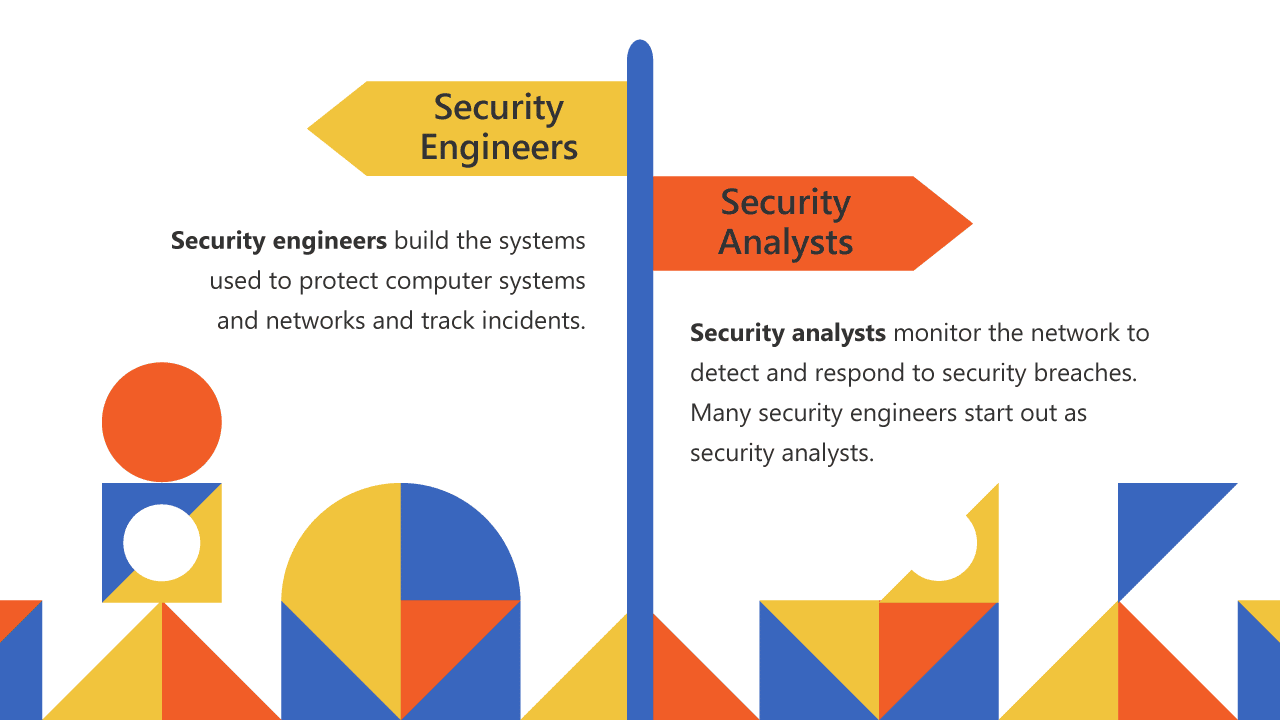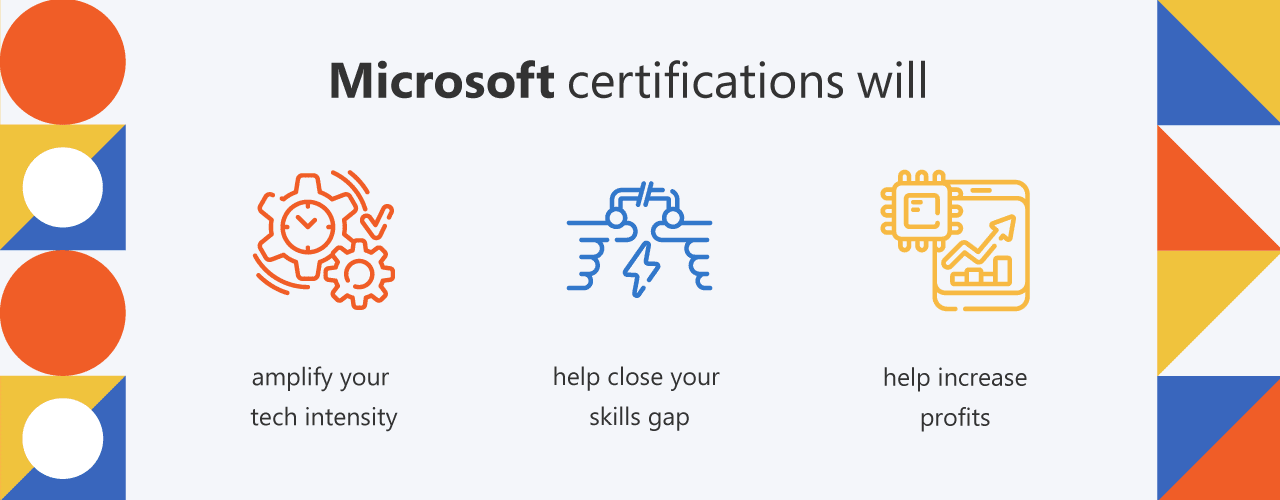Microsoft Certified: Azure Security Engineer Associate (The Guide for 2023)
Microsoft Certified: Azure Security Engineer Associate (The Guide for 2023)

Have you wondered what exactly a security engineer does?
The security engineer is a vital part of any company’s infrastructure. They work to keep our networks safe and secure, implementing new features or fixing old problems when they arise, to ensure organizations can continue running seamlessly.
Like any other professional, the tasks you will be performing as a security engineer depend on your company and industry. That said here are some job descriptions and responsibilities that we found on security engineer job listings on Linkedin:
- Identifying security measures to improve incident response
- Responding to security incidents
- Coordinating incident response across teams
- Performing security assessments and code audits
- Developing technical solutions to security vulnerabilities
- Researching new attack vectors and developing threat models
- Automating security improvements
Why should you pursue a career in security engineering?
Security engineers have a unique opportunity to create an impact at their company by helping safeguard profits and reputation. They’ll also work in the evolving environment of new threats that are emerging regularly, which can make this position exciting if they enjoy challenges and love learning more about security issues as they arise.
Security engineer vs. security analyst
Credit: Coursera, 2022
Azure Security, as a whole.
The need for increased security is paramount in this day and age. Cyberattacks are becoming more frequent, leaving organizations vulnerable to hackers who want access to their system files or even worse – data theft. Fortunately, we have Microsoft Azure on our side. Azure provides security from the ground up—from identity and access control to security posture management, threat protection, and much more. And Azure security engineers are on the front lines, helping to keep their organizations’ infrastructure, apps, and data safe in the cloud.
What does an Azure Security Engineer Associate do?
Azure Security Engineers are the vanguard of cloud security, they implement security controls and threat protection; manage identity and access; and protect data, applications, and networks in cloud and hybrid environments as part of the end-to-end infrastructure.
Level up with Microsoft Certified: Azure Security Engineer Associate
You can now prove that you have subject matter expertise in implementing security controls and threat protection, managing identity and access as well as protecting data, applications and networks in cloud and hybrid environments with the Microsoft Azure Security Engineer Associate certification. The way you earn this top cybersecurity certification is by passing the Exam AZ-500: Microsoft Azure Security Technologies.
If you’re looking for a way to expand your security knowledge and abilities, then the following Microsoft certification could be right up your alley. It will teach everything from maintaining an effective posture in order to protect ourselves against cyber threats all the way to responding effectively when incidents do happen so we can minimize their impact as much as possible.
What kind of knowledge and experience should you have?
Candidates for this Azure certification must have expert Azure administration skills which can be attained via the Microsoft Certified: Azure Administrator Associate credential. In addition to Azure administrator skills, you should have solid scripting and automation skills. Plus, you need a deep understanding of networking, virtualization, and cloud N-tier architecture. And it’s important to be thoroughly familiar with cloud capabilities, along with Azure technologies and other Microsoft products and services.
How can you get ready?
To help you plan your Azure certification journey, check out our infographic. It could also help with your journey towards Microsoft Certified: Azure Security Engineer Associate.
To map out your journey, follow the sequence in the infographic. First, decide whether this is the right certification for you, and be sure your Azure administrative skills are up to date.
Ready to be Microsoft certified? Here are the important details you might need!
The AZ-500: Microsoft Azure Security Technologies exam is designed for professionals who want a thorough understanding of how Azure security controls protect identity, and access data and applications in both on-premises environments as well as cloud hybrid setups.
The responsibilities of a security engineer in charge of keeping watch over Microsoft’s Azure network include identifying and remediating vulnerabilities and performing threat modelling to identify potential threats before they can harm the company’s assets.
Azure security engineers often serve as part of a larger team to plan and implement cloud-based management and security.
Candidates for this exam should have practical experience in the administration of Azure and hybrid environments. Candidates should have experience with infrastructure as code, security operations processes, cloud capabilities, and Azure services.
Skills Covered:
- Implement enterprise governance strategies including role-based access control, Azure policies, and resource locks.
- Implement an Azure AD infrastructure including users, groups, and multi-factor authentication.
- Implement Azure AD Identity Protection including risk policies, conditional access, and access reviews.
- Implement Azure AD Privileged Identity Management including Azure AD roles and Azure resources.
- Implement Azure AD Connect including authentication methods and on-premises directory synchronization.
It’s time to level up!
Cutting-edge cloud security is revolutionizing the way organizations keep their data, devices and apps secure in today’s world. As an Azure Security Engineer you have the power to lead your organization into a new era of digital protection with decisive measures backed by critical skills across infrastructure & operations – all fundamental aspects when working on Microsoft Azure.
Through skillful implementations and assessments of IT environments, assets can be safeguarded against emerging threats around every corner; so prove yourself as one who embraces modern challenges in order to realize tomorrow’s safety.
Most Popular Questions About Azure Certifications
1) Are Microsoft Azure certifications worth it?
Azure certifications offer IT, professionals, an edge in this cloud-based and connected world. Job seekers and seasoned professionals alike can use Azure certifications to help advance their career—in their existing organization and role or in new ones—earn recognition, and validate their technical knowledge and abilities in current and future industry job roles and organizations can use certifications to identify the talent they need and build the technical skills of their workforce
2) How do Microsoft Azure certifications benefit me?
Azure certifications are globally recognized and industry-endorsed. They’re used both by job seekers (individuals) and by talent seekers (organizations) as a way to validate that a candidate has the skills to do the job. They’re a powerful differentiator in the quest to match skilled talent to key jobs in the digital age.
Whether you’re looking to level up your career or to jump-start a new one, you can use Azure certifications to build and validate your technical knowledge and abilities in the modern cloud environment. In these unsettling times, earning your Microsoft Certification can help provide you with the edge you need with organizations that are seeking skilled talent.
3) Why are Microsoft Azure certifications so important in today’s landscape?
Azure is the most widely used cloud computing platform, leading the cloud industry forward globally. A large majority of organizations and enterprises – small and big, have made the leap towards embracing cloud technology. This paradigm shift has also revealed that organizations want to remain competitive as the demand for cloud-based and centred solutions grows daily, directly affecting the need for technology professionals with cloud knowledge.
Microsoft has been at forefront of ensuring that the global workforce is prepared to take on this substantial task by validating and certifying top applicants who are the best suited for a specific job position, according to Microsoft. Microsoft certifications can undoubtedly add value to a candidate’s professional journey as most businesses now prefer to have prospective employees with certifications in tow.
4) What are the available levels of Azure credentials?
There are four levels of Microsoft certifications Azure Certification path levels, covering beginner to expert level azure cloud certification.
- Fundamentals – If you are a beginner, your Azure journey will start with Fundamentals Certification. Candidates with a non-technical backdrop can also step into cloud computing through these certifications.
- Associate – Candidates who have a fair idea of Azure can aim toward associate certifications.
- Expert – You can obtain an expert certification if you have experience, a solid comprehension of the subject, and associate-level familiarity with Azure.
- Specialty – It is the highest level of Azure certification. Candidates can opt for this Azure certification if they want to apply for roles like Azure IOT Developer Specialty and Azure for SAP Workloads.
5) Will Azure work for my industry?
Azure provides solutions for all industries, through proven combinations of cloud products and services. Address your industry-specific business challenges today, and prepare for the future by innovating with Azure solutions.
6) How does Azure compare to other clouds?
Azure is the only consistent hybrid cloud, that delivers unparalleled developer productivity, provides comprehensive, multilayered security, including the largest compliance coverage of any cloud provider, and you’ll pay less for Azure as AWS is five times more expensive than Azure for Windows Server and SQL Server.
[/fusion_text][/fusion_builder_column][/fusion_builder_row][/fusion_builder_container]








